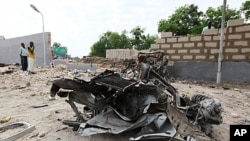Nigeria's capital is under a limited curfew following a series of bombings in the city of Maiduguri. Nigeria's military is asking civilians to come forward with information that might help lead to the capture of those responsible for the attacks.
Beer halls, night clubs and movie theaters in Abuja must now close by 10:00 p.m. local time, everyday of the week. Parks and gardens that admit children must be closed by 6:00 p.m.
In a written statement, the city's spokesman Muhammad Hazat Sule says the measures are needed to ensure lives and property in the federal capital territory in light of what he called “the prevailing security concerns.”
Bombings Sunday and Monday in the city of Maiduguri killed at least 28 people. Those attacks are being blamed on Muslim fundamentalists from a group known as Boko Haram, which claimed responsibility for the bombing of national police headquarters in Abuja earlier this month.
A joint military task force has now taken control of Maiduguri. Nigerian Army Chief of Staff Onyeabo Azubuike Ihejirika says authorities are asking the public to help apprehend those responsible.
“Internal security problems are not purely military," he said. "Even the military aspect requires a lot of cooperation from all well-meaning Nigerians. Hence, I call on religious leaders and the populous to expose the perpetrators."
The army chief of staff warned Nigerians to beware of gifts they might receive at special events because those packages could be used to conceal bombs.
Boko Haram recognizes neither the Nigerian constitution nor the federal government in Abuja and says it is fighting to establish a separate nation in northern Nigeria ruled by Islamic law.
University of Abuja sociology professor Abubakar Umar Kari says the group is the biggest security challenge for President Goodluck Jonathan's new government.
"By embarking on unprecedented attacks against the state and a section of the community, Boko Haram is easily the most organized and concerted threat to society as a whole," he said.
Boko Haram launched a coordinated uprising across much of the north in 2009. That revolt was put down by Nigeria's military in a campaign that killed more than 800 people, including Boko Haram leader Mohammed Yusuf.
Since then, the group has focused more on ambushing military convoys and political and religious leaders as well as bombing police and military posts.
Nigerian Capital Under Limited Curfew Following Maiduguri Bombings




